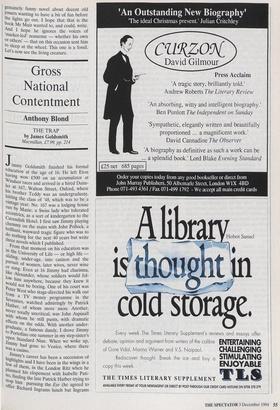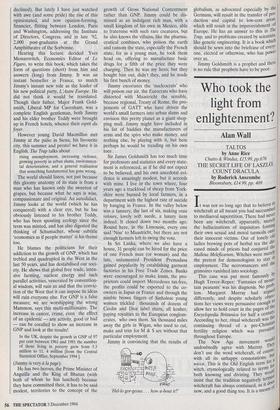Gross National Contentment
Anthony Blond
THE TRAP by James Goldsmith Macmillan, £7.99, pp. 214 by James Goldsmith Macmillan, £7.99, pp. 214 murk Jimmy Goldsmith finished his formal education at the age of 16. He left Eton having won £500 on an accumulator at Windsor races and arrived in a hired Daim- ler at 1K '.7, Walton Street, Oxford, where his brother Teddy was an undergraduate, hitting the class of '48, which was to be a vintage year. No. 167 was a lodging house nib by Maxie, a Swiss lady who tolerated eccentrics, as a sort of kindergarten to the Cavendish Hotel. I first saw Jimmy playing chemmy on the stairs with John Pollock, a brilliant, wayward tragic figure who was to do nothing for the next 40 years but write three novels which I published. . Prom that moment on his education was In the University of Life — or high life — Sliding, under-age, into casinos and the Pursuit of women, later wives, never wine or song.-.
Even at 16 Jimmy had charisma,
like Alexander, whose soldiers would fol- low him anywhere, because they knew it would not be boring. One of his court was Peter West who stage-directed his walk out from a TV money programme in the Seventies watched admiringly by Patrick Hutber, of whom more anon. Another, never totally uncritical, was John Aspinall with whom he still punts, with dramatic effects on the odds. With another under- graduate, a famous dandy, I drove Jimmy to Portofino one summer in my step-sister's Open Standard Nine. When we woke up, Jimmy had gone to Venice, where there was a casino.
Jimmy's career has been a succession of highlights and I have been in the wings in a few of them, in the London Ritz when he planned his elopement with Isabelle Pati-
o% finding the late Patrick Hutber trying to stop him Pursuing the Eye (he agreed to
Offer Richard Ingrams lunch but Ingrains declined). But lately I have just watched with awe (and some pride) the rise of this opinionated, and now opinion-forming, financier, flitting between London, Paris and Washington, addressing the Institute of Directors, Congress, and in late '92, 2,000 post-graduates at the Grand Amphitheatre of the Sorbonne.
Hearing this lecture decided Yves Messarovitch, Economics Editor of Le Figaro, to write this book, which takes the form of questions (short) from him and answers (long) from Jimmy. It was an instant bestseller in France, to match Jimmy's instant new role as the leader of his new political party, L'Autre Europe. He did not think it would be translated. Though their father, Major Frank Gold- smith, Liberal MP for Cavenham, was a complete English gentleman, both Jimmy and his elder brother Teddy were brought up in French hotels, whence their esprit du foyer.
However young David Macmillan met Jimmy at the palio in Siena, his favourite city, this summer and presto! we have it in English. The Trap talks about
rising unemployment, increasing violence, growing poverty in urban slums, environmen- tal deterioration, and a general realisation that something fundamental has gone wrong.
The world should listen, not just because this gloomy anatomy of its state is from a man who has known only the sweetest of grapes, but because what he says is wise, compassionate and original. An autodidact, Jimmy looks at the world (which he has conquered) with a clear eye, but he has obviously listened to his brother Teddy, who has been spouting ecology since the term was minted, and has also digested the thinking of Schumacher, whose subtitle 'economics as if people matter' is his theme too.
He blames the politicians for their addiction to the growth of GNP, which has trebled and quadrupled in the West in the last 50 years, and has destabilised our soci- ety. He shows that global free trade, inten- sive farming, nuclear energy and such parallel activities, venerated by convention- al wisdom, will ruin us and that the convic- tion of the West that it can impose its ideas will ruin everyone else. For GNP is a false measure; we are worshipping the wrong Mammon, says this multi-milllionaire. The increase in cancer, crime, even the effect of an epidemic — any activity, good or bad — can be coralled to show an increase in GNP and look at the results!
In the UK, despite the growth in GNP of 97 per cent between 1961 and 1981 the number of those living in poverty grew from 5.3 million to 11. 4 million [from the Central Statistical Office, September 1994].
(Jimmy is very h la page).
He has two heroes, the Prime Minister of Anguilla and the King of Bhutan (with both of whom he has lunched) because they have committed their, it has to be said modest, territories to the concept of the growth of Gross National Contentment rather than GNP. Jimmy could be dis- missed as an indulgent rich man, with a small kingdom of his own in Mexico, able to fraternise with such rare creatures, but he also knows the villains, like the pharma- ceutical combines, who poison the earth and ransom the state, especially the French state, for as a young man, he took them head on, offering to manufacture basic drugs for a fifth of the price they were charging. Then he was my hero; but they bought him out, didn't they, and he made his first bunch of money.
Jimmy excoriates the `nucleocrats' who will poison our air, the Eurocrats who have distorted with Maastricht the sensible, because regional, Treaty of Rome, the pro- ponents of GAIT who have driven the world's small farmers into urban slums and envision this pretty planet as a giant shop- ping mall. Jimmy might have included in his list of baddies the manufacturers of arms and the spivs who make money, and nothing else, by playing with it, but here perhaps he would be treading on his own toes.
Sir James Goldsmith has too much time for professors and statistics and every state- ment is referenced, as if he did not expect to be believed, and his own anecdotal evi- dence is amazingly modest, but it accords with mine. I live in the town where, four years ago a truckload of sheep from York- shire were burned by local farmers, in a department with the highest rate of suicide by hanging in France. In the valley below was a tannery, the last of six, making veau velours, lovely soft suede, a luxury item indeed. It closed down two months ago. Round here, in the Limousin, every one said 'Non' to Maastricht, but there are not enough farmers left to swing the vote.
In Sri Lanka, where we also have a house, 31 people can be hired for the price of one French man (or woman) and the late, unlamented President Premadasa gained popularity by establishing garment factories in his Free Trade Zones. Banks were encouraged to make loans, the pro- prietors could import Mercedeses tax-free, the profits could be exported to the co- owners in Japan or France and through the nimble brown fingers of Sinhalese young women trickled thousands of dozens of Cardin and Dior label shirts, all kosher, paying royalties to the European conglom- erates, who own them. Six thousand miles away the girls in Wigan, who used to cut, make and trim for M & S are without that particular employment.
Jimmy is convincing that the results of gor-geous. . . how a-bout it?' globalism, as advocated especially by the Germans, will result in the transfer of pro- duction and capital to low-cost areas, which will result in the impoverishment of Europe. He has an answer to this in The Trap, and to problems created by scientists, like genetic engineering. It is a book which should be sewn into the briefcase of evert' one, elected or otherwise, who has power over us.
Jimmy Goldsmith is a prophet and there is no rule that prophets have to be poor.











































































 Previous page
Previous page